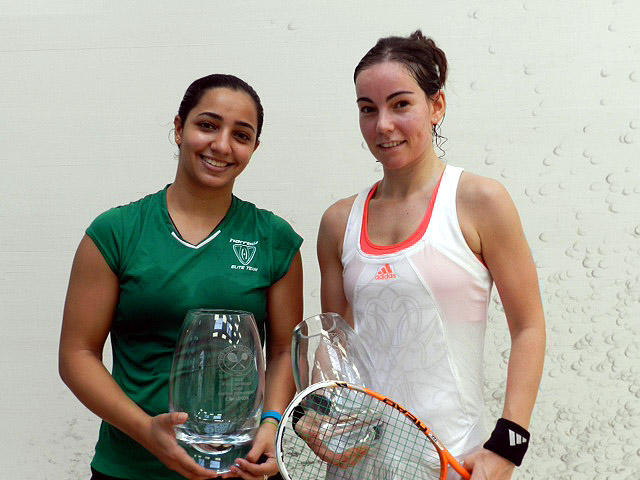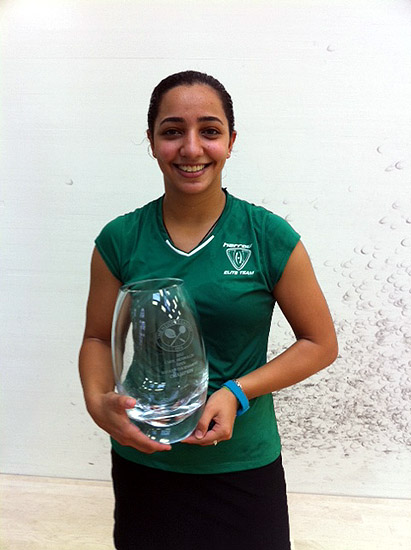El Weleily Surges To Victory In $50,000 WISPA Weymuller Open
By Rob Dinerman for DailySquashReport.com

Dateline September 25th --- In an overwhelming display of talent, imagination and athleticism that for sheer aggregate brilliance may never have been equaled in the 38-year history of this iconic championship, Raneem El Weleily, the unseeded 22-year-old Egyptian, capped off her week-long Cinderella run with a compelling 11-7 15-13 11-4 victory over top-seeded two-time defending champion Jenny Duncalf this afternoon in the final round of the $50,000 Carol Weymuller Open, hosted as always by the Heights Casino club on Montague Street in Brooklyn Heights. Though confronted with two match-balls-against in her very first match (against 2010 Weymuller finalist Laura Massaro) and a two-games-to-one deficit in her quarterfinal (against Camille Serme), El Weleily wound up defeating four WISPA top-10 players (Massaro, Serme, Madeleine Perry and Duncalf), all of whom had winning records against her, and winning the first Gold-level WISPA tournament of her young career.
But it is not so much the fact of El Weleily’s quartet of wins as the manner in which she achieved them, especially in the semifinal and final, that marks this weekend as memorable, and quite possibly a harbinger of a truly enduring level of stardom. Trailing Perry 12-11 in her first game on Saturday afternoon, El Weleily responded with a 16-0 run from which the beleaguered WISPA No. 3 Perry would never recover. But while there was much admiration for the Egyptian’s trio of excellent pre-final wins over higher-ranked players, the widely held belief entering the final this afternoon was that the more experienced Duncalf, coming off a solid straight-set semifinal win of her own over Kasey Brown, playing in her fourth Weymuller final in the past five years, including dominant performances in the finals each of the past two years, and owner of both a 10-spot edge over El Weleily in the world rankings and a 4-0 head-to-head mark, was well positioned to retain this title. After all, this was the first time El Weleily had ever even reached a Gold-level WISPA final, hence she had already had a career breakthrough of sorts by Saturday evening, and for her to go on to WIN the final under these circumstances might have been regarded as too much too soon, especially since El Weleily’s shot-making had been so wondrous against Perry that it was hard to believe that she could duplicate that output less than 24 hours later.
The soothsaying sentiment aside, El Weleily picked up in the first game of her Duncalf final right where she had left off in the close-out third game of the semi with Perry, especially in the four-point skein from 7-all --- consisting of a well-disguised backhand working-boast, a wrist-flick nick-finding cross-court drop, a backhand length that clung too close to the left wall to be returned, and a forehand cross-court that was so shallow that it died before Duncalf could scoop it back into play --- that gave her that opening frame. Duncalf was forcing much of the action with her aggressive attempts to cut the ball off in mid-court, but El Weleily unflappably lobbed her way out of trouble and, as noted, scored with a variety of shots that carried into the second game as well.
Here, though, Duncalf was able to wrest the initiative away, especially in a late-game three-point patch from 7-6 that seemingly gave her a lock on that game. It was during this stretch that El Weleily, whose game has heretofore always had a tendency to run hot and cold, had her only concentration lapse of the match, reacting to a bad bounce (6-8) by trying to “steal” the ensuing point with a rash serve-return drop-shot attempt that rang loudly off the tin. One Duncalf drop-shot winner later, the top seed and WISPA No. 2 stood at 10-6 and the match appeared imminently about to become a best two-out-of-three with Duncalf having the momentum.
Instead, El Weleily was able to force the game into a tiebreaker, benefiting from a Duncalf tin, a mis-hit winner, another Duncalf tin (this one after one of the longest exchanges of the match) that made the score 9-10, and a totally unexpected El Weleily backhand working-boast that was too widely angled for even Duncalf, one of the tour’s fleetest retrievers, to run down. There were some pulsating points during the ensuing overtime session, by which time everyone present knew that Duncalf desperately needed that game. She had a game-ball at 11-10, then another at 13-12 that was wiped away when she hit a wayward rail back at herself on the left side for a stroke call against her. El Weleily then earned a game-ball opportunity of her own with a delicate backhand drop shot, which she converted when she drew Duncalf up to the front left, then snapped a severe cross-court that died right at the back wall.
Buoyed by her eleventh-hour rescue of what had appeared to be a lost second game, as well as by the two games to love advantage she now enjoyed, El Weleily seemed to almost be in a dream-like state as she played the third and final game. She was flowing effortlessly to the ball, conjuring up angles that were comprised of equal parts creative genius and compelling ball placement, alternating parabolic lobs with drop shots that looked like they were nearly melting on the front wall. On the other side, as the deficit deepened (especially during the run from 3-all to 9-3 that for all intents and purposes sealed the outcome), Duncalf, a never-say-die veteran on the WISPA wars who however was up against an opponent who, for this afternoon at least, was playing at an unapproachably high level, was doing everything she could to hang in, extending the points with admirable effort and tenacity, only to see nearly every exchange end with yet another extraordinary El Weleily angle or a cross-drop that rolled insolently out of the nick.
The point that made the score 9-3 was actually a fluke roll-out off the back wall, but by then it didn’t matter. Duncalf pridefully slashed a backhand winner to get to 4-9, but she then caught the tin on an overhead drive and at match-ball, El Weleily finished off an absolute masterpiece with a backhand rail that stayed glued to the left wall, stymieing Duncalf’s effort to scrape it back into play. For someone who had just accomplished a huge career breakthrough, El Weleily handled her victory with the same calm aplomb with which he had played the entire tournament – there were no whoops of triumph, just a modest handshake and a humble speech at the trophy presentation.
When asked afterwards by Tournament Director Linda Elriani, the Squash Director at the host club and herself a top-five WISPA player as recently as a half-dozen years ago, to explain to the capacity crowd how she could have played as well as she had, El Weleily politely answered that she had just played the best squash of her life, to which Elriani humorously but not inaccurately responded that this might have been the best squash of ANYONE’S life! Whatever happens in Philadelphia next week at the U. S. Open, there is no doubt that what El Weleily achieved this past weekend has transformed the competitive dynamics of the WISPA tour. No longer an “up-and-coming player” whose inconsistent use of universally recognized exceptional talent made her a bit of a frustrating enigma, she has now emphatically announced that she has arrived as a top-tier contender capable not only of knocking off anyone on the circuit on a given day but of stringing that type of win together and winding up in the winner’s circle. To anyone who saw her perform over the past four days, and witnessed how her confidence grew as she inexorably progressed from one unforeseen but thoroughly decisive win to another, there seems little question that this will by no means be the last time that an elite WISPA tournament ends with El Weleily hoisting the championship trophy, not by a long shot.
Perhaps more than any tournament in the United States, the Weymuller is a uniquely “community tournament,” a tribute to the wonderful support the event (named in honor of the popular pro who had so much to do with instituting the vaunted junior program for which Heights Casino is best known) always draws from the membership. Tournament Chair Becky McDevitt, assisted by Adult Squash Committee Chair Emily Lungstrum, Club General Manager Cristian Petrina and the rest of the Weymuller Committee, fully upheld that tradition this year, as Corporate Sponsor Corcoran Group Real Estate was backed by a slew of benefactors, patrons and supporters among the club members, many of whom also housed the players (an annual Weymuller Open tradition), who reciprocated by spending much of their between-matches time hitting balls with the members’ children. It is therefore not surprising that many of the WISPA player group return year after year to the three-story brick building right near the Promenade, or that they feel a sense of loyalty to the Weymuller event that is rare and truly admirable.

Back To Main
